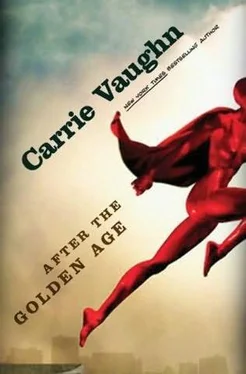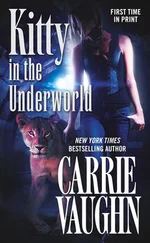“I’ll be there.”
* * *
She asked Michael to drive her in a West Corp sedan, to save time. He seemed happy to do so—like he was pleased that she was finally taking advantage of her birthright. She saw it as giving up freedom; maybe not so much giving up as trading.
Dressed in a skirt and jacket, looking as official as possible with a bandaged forehead, Celia consulted City Hall’s building directory and took the elevator to the basement. There, plastic signs with arrows directed her to her destination. She pushed open the door with frosted glass marked with black lettering: VITAL STATISTICS.
The Department of Vital Statistics occupied a corner of the basement of City Hall. The records themselves were processed in any number of departments and offices in the more accessible regions of the building and city government: marriage certificates, birth certificates, divorce settlements, death certificates. Once finalized, they came to live here, in the depths. Most would never see the light of day again.
She entered yet another room with stark fluorescent lighting filled with rows and rows of filing cabinets, shelves with banker’s boxes, and file folders, smelling of ripe dust and old paper. It felt like her element. She was at home here and knew what she was looking for.
Before she could get to the files, she had to pass through a reception area and set of desks. Four people worked here, it looked like; there were four desks with nameplates and the usual family photos, sickly houseplants, and odd figurines and detritus that usually occupied office workspaces. The farthest one over stood in front of a closed door labeled with a sign: RESTRICTED. The sealed records section.
No one was here. On the first desk, the receptionist’s desk, one of those signs printed with a clock and moveable plastic hands read: OUT TO LUNCH, BACK AT 1:30. She had half an hour. She went to the restricted door and tried the knob—unlocked.
She owed Bronson big time for this.
Inside the room, she turned on the light. Here, folders crammed the shelves. This was a smaller collection than the main part of the department, but still daunting. And old. Dust covered most of the files, and she could mark the difference between various styles and materials used in file folders over the years.
She went to the shelves marked “Adoption Records,” then went to the shelves labeled “P.”
When the court finalized an adoption, it issued a new birth certificate with the adoptive parents’ names in the appropriate boxes. But the original certificate completed at the child’s birth remained on file. Anthony Paulson’s birth certificate, and independent verification of the identity of his birth parents, should be here.
She muttered, “P … p … Paneski … Parker … Pastern … Paulson.”
There it was, a stiff and aged folder, fifty years old. She opened it; the paper was slick under her fingers. Faded pink cover sheets announced that the material within was sealed by court order, access restricted.
She started searching. They were right on top, the amended birth certificate showing that Anthony Paulson’s parents were Claire and Richard Paulson, and under it a birth certificate stamped “Original.” Baby Anthony. Father—unknown. The space was left blank. Mother—
Janet Travers. One of the Leyden laboratory technicians.
Celia had ten more minutes. She rushed—calmly, being sure to breathe—back to the front office to make a photocopy, quickly folded it into a pocket, and returned the original to the file, and the file to the shelf. She couldn’t think of any way to replace the half-century layer of dust over it. She had to hope it would be another half century before anyone came looking for the file again.
She didn’t leave the room. She had a few more minutes left, and a nagging curiosity. The set of shelves in the back labeled “Juvenile” beckoned. Her practiced gaze scanned quickly—and found “West, Celia,” stamped “Sealed” in bold letters like all the others.
The file was mercifully thin. One indiscretion. That was all it took.
She slipped the folder into her attaché case and strode out of the room, double-checking to see that the door locked behind her. In the hallway leading to the elevators, she passed a trio of laughing, gossiping women. Celia flashed them a smile and they didn’t give her a second glance.
Once the elevator started up, carrying her back to the ground and light, Celia leaned on the wall and sighed. Never mind what she’d discovered about Anthony Paulson. The file she’d stolen burned red-hot where it lay in her case, pressed against her thigh.
She hadn’t stolen it; it was hers .
Too much to do, but this trumped everything. Back in the company sedan, she told Michael she had to pick up some things at home—her own apartment. She asked him to wait in the car for her. Fifteen minutes, that was all she needed. Inside her apartment, she locked the door, took the battery out of the smoke alarm, and found some matches.
Manic, wide-eyed, breathing too hard, she stood over the kitchen sink, the folder in her hands. Inside she read the pages: the arrest record, fingerprints, the facing and profile mug shots of a sullen teenager with shoulder-length, too-teased red hair, eyeliner blacking her eyes, and the strap of a camisole hanging off her shoulder. God, she looked awful. Mug shots always looked terrible, but this one seemed to draw out the ugliness that had lived inside that girl—a sort of disheveled fatalism. Appleton had arrested her at West Plaza the morning after the incident, threatening her with charges of conspiracy, intent to commit mayhem, and the like. Ultimately not charged, not tried. Released into the custody of Warren and Suzanne West, who promised that this sort of thing wouldn’t happen again. As if they’d had the authority to make that promise.
Celia lit a match.
It didn’t mean anything. People already knew. Just because the physical file didn’t exist anymore, wouldn’t make their knowledge disappear.
But this wasn’t for other people, this was for her. This was an exorcism.
She touched the match to all four corners of the open folder, then touched it to as many places in the middle as she could before the flame burned to her fingers. She dropped the whole mess into the sink. The crisp, eight-years’ aged paper crackled, blackened, and flames swelled over it. The photograph curled and melted.
She opened the windows, turned on a fan. The smoke poured up, black and sour. It flowed out the window above the sink, dissipated, and melted into the sky.
Let it go. Let it all blow away.
THE city had become as taut as a drawn bow string, quivering, more than ready for release. People hurried on the streets, waiting for bombs to explode or runaway buses to turn the next corner. Restaurants shut down, no one was shopping. People seemed content to stay indoors, watching TV, waiting for the next big attack.
She couldn’t help but think that all these petty little crimes and attacks were merely means to an end, to hold the city in thrall to terror. And here they were. Even the Destructor had never been so calculating.
It was quick work with a phone book and Internet connection to find the location of Janet Travers, the point where the two threads of inquiry Celia had been following matched up.
Travers had an apartment at an assisted living community in a quiet, middle-class neighborhood at the edge of town, the kind with wide, tree-lined streets and signs that warned of children playing. The retirement community had a brick, neocolonial apartment building and scattered bungalows, all enclosed within walled gardens, isolated, quiet and pretty.
Celia signed in with the receptionist. “Let me call up to her room and see if she’s taking visitors. Celia, you said?”
Читать дальше












